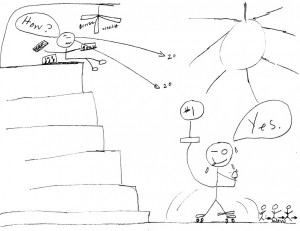
I have loved the following Theodore Roosevelt quote since my colleague, Bill Silverman, shared it with me almost ten years ago. It resonated with me then and is even more relevant now given my current work. Essentially, it delineates the two types of people in our society – The Critic and The Doer.
“It is not the critic who counts: not the man who points out how the strong man stumbles or where the doer of deeds could have done better. The credit belongs to the man who is actually in the arena, whose face is marred by dust and sweat and blood, who strives valiantly, who errs and comes up short again and again, because there is no effort without error or shortcoming, but who knows the great enthusiasms, the great devotions, who spends himself for a worthy cause; who, at the best, knows, in the end, the triumph of high achievement, and who, at the worst, if he fails, at least he fails while daring greatly, so that his place shall never be with those cold and timid souls who knew neither victory nor defeat.” – Theodore Roosevelt
Perhaps after reading the quote you are uncomfortable dividing all of mankind into two groups. Maybe you believe there are many different types of people in this world and that not everyone fits into one of these two boxes. While there may be some truth to that position (there are people who are a combination of the two, at times a particular person can be a critic and at others a doer), on the whole, I’d have to disagree. At our core, each of us is either The Critic or The Doer. Your default is one or the other. Whether or not you are aware of it or accept it, you show up as one of them most every time.
At this point you may be saying, “Okay, fine, but who cares?” or perhaps, “Sounds good, but would she get to the point already?” Fair enough. Here is the bottom line – to be successful or to get to the next level in your career, you need to figure out which you are. Without knowing your customary even preferred lens, it is impossible to evaluate the integrity of your assessment process. For instance, we cannot know whether you are finding fault with a particular situation because there is legitimate fault to be found or whether it is just what you do.
Let us imagine that you are presented with a new business opportunity. You start to evaluate the opportunity and immediately see that it has “problem” written all over it – it is going to take time and money, you are going to have to stretch to get it done, and the ROI is questionable at best. Fair enough, but here is the thing. If you are a critic, this is your modus operandi. You always spot the issues and identify roadblocks. Figuring out why the project is not going to work is second nature to you.
The fact is, just because you can see the gaps does not mean they actually exist. Think about a mirage. The viewer would swear up and down that there is an oasis in the desert, but it is just an optical illusion nonetheless. In truth, it is difficult for The Critic to see the upside.
Every critic has his own reasons for hanging out in the bleachers. Being in the arena is risky and the view stinks. . Being a spectator is more comfortable and all of that tire kicking is actually pretty enjoyable. The Doer risks failure, injury, and embarrassment and that is just not The Critic’s style. Given the choice, The Critic would rather be John Mara than Eli Manning. There is a lot less dust, sweat, and blood in the corporate suite.
Who do you want to be? Is that the Critic on your shoulder pointing out obstacles? Is that the Doer whispering in your ear telling you to accept the challenge? Take the time to figure out whether you are the strong man or whether you just are observing him.
As for me, I’ve got to go. There’s marathon training to do. I know, I know, it’s bad for my knees and yes, I can see that it is too dark for a run. Thank you very much, but I am going to take my chances anyway. Personally, I want to know the triumph of achievement and I am even okay failing while daring greatly. Either way, I always sleep better after a good hard run.
